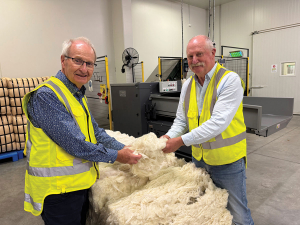A new screening tool, the StaphGold ELISA test, gives farmers a panoramic view of subclinical Staphylococcus aureus mastitis across dairy herds, claim its developer Koru Diagnostics.
The company claims a highly accurate laboratory test identifies specific biomarkers of a dairy cow's immune response to S. aureus bacteria, and has recently been validated to screen whole herds, rather than just high-somatic cell count cows (>250,000 SCC/mL).
The test can pick up 'incognito' Staph cows that are quietly existing within a farm's low-SCC animals, shedding bacteria intermittently and spreading the infection to healthy cows, usually via milking equipment.
Earlier studies by Koru Diagnostics claim potential for New Zealand farmers to recoup $135 million in lost production revenue across the national dairy herd, improved herd health, and greater milk production efficiency, if they proactively manage subclinical mastitis infections.
Dr Tony Pernthaner, chief scientific officer at Koru Diagnostics, says a whole-herd screening approach provides farmers with more information to get on top of contagious S. aureus mastitis, "because infected cows that have low or only slightly elevated somatic cell counts are still identified, whether they are shedding the pathogen or not".
 |
|---|
|
Milking positive animals last is a key measure to prevent the spread of contagious mastitis.
|
"Whole herd testing is particularly useful for an end-of-lactation screen as it enables the farmer to make more informed dry cow therapy decisions. Animals that will benefit most from dry cow antibiotics can be identified with high accuracy."
The New Zealand biotech company says it has been gathering and analysing StaphGold data from entire herds in the Manawatu, New Zealand and Tasmania, Australia, comprising thousands of cows.
Rhys McKinlay, CEO at Koru Diagnostics, says based on trial data, a high prevalence of S. aureus in a high cell count group could signpost materially significant levels of S. aureus infection in low cell count cows as well.
“A 1000-cow farm with around 100 positive cows among their 200 high cell count group could have a further 80 S. aureus-positive cows hidden within the remaining 800-strong low cell count group that would otherwise go untested if farmers were to just test high cell count cows.
“Identifying those extra 80 cows makes a big difference to farmers. Being able to proactively manage 180 Staph cows rather than just 100 means a much greater impact on minimising further spread of S. aureus infections and the accompanying milk production losses.
 |
|---|
|
StaphGold test results can be reviewed via mobile phone.
|
“Elevated cell count is a possible indicator for S. aureus mastitis infections – but not always. What we are seeing suggests that – if farms screen their high cell count group and find a high prevalence of S. aureus – widening the lens to screen the rest of the herd is a very good idea.”
StaphGold testing is performed on milk samples from individual cows at herd testing laboratories and some dairy laboratories across Australia and New Zealand. Testing services are currently available through selected vet clinics in New Zealand (via Gribbles Veterinary Pathology) and through TasHerd, National Herd Development and Herd Improvement Co-Operative (HICO) herd testing companies in Australia.




















